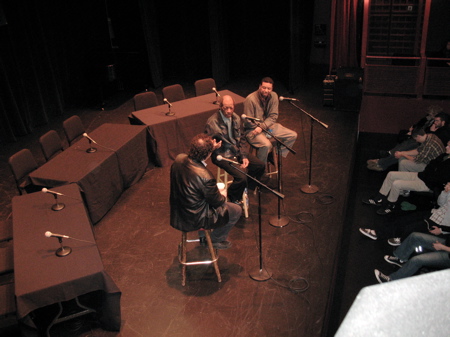
9:53 p.m.: After the show, after the applause, after the standing ovation.
“I actually liked it a lot,” Mrs. Scatter said. “I found it surprisingly moving.”
Yes, it is. This is an opera that’s hardly been produced since its debut in 1993, and now it seems ready to join the repertoire. It stands up to the test of time.
And time, of course, is part of what Glass/Cocteau are talking about. A miracle occurs in this story, the miracle of moving time itself backwards after it’s already played out its events. The book of life and death is wiped clean — returned, if not to the beginning, to a point that allows a second chance. Wouldn’t we all love that? And why Orphee, who seems an ungrateful, selfish sort? Because. And “because” is enough.
Why isn’t this opera called Orpheus and Eurydice, as so many other versions of the myth have been? Because, although the two end up together (is it a “happy” ending? — in Ovid and most versions, Eurydice is lost forever when Orpheus glances back) this version isn’t really about Orpheus and his wife. It’s about Orpheus and Death, the Princess, who sets the whole thing in motion by falling in love with the poet.
This is a vigorously dramatic version of the myth, with fine stage direction by Sam Helfrich that is emotionally taut but not above a good sight gag. Once Orphee and Eurydice are returned to life under orders that he can never look at her, Eurydice pops behind chairs and crawls around the floor to avoid his glance: It has an I Love Lucy tinge to it.
*****
PHILIP GLASS BONUS TRACK #5
On the musical establishment and making it as a musician:
“You’re better off going out on your own than going through the establishment. The establishment, the price is too high.”
But he added that economic conditions make that much harder than when he was young, especially if you want to work in a place like New York, which is the sort of talent pool you want to immerse yourself in.
“In my business, anyone who makes a living, I say, ‘Hats off.'”
*****
PHILIP GLASS BONUS TRACK #6
On the pathfinders when he was building his career:
“The jazz world was the real avant-garde. These were people who didn’t make any money and lived for their art.”
He mentioned Ornette Coleman among the jazz geniuses. But there were many others the public never knew, he added, and there still are. He runs into them all the time on the streets of New York: black, white, Hispanic musicians who are doing genuinely exciting work but can’t get a break.
*****
PHILIP GLASS BONUS TRACK #7
On the business of music:
“I was never the kind of person who was going to write a work of music that would never be played. I never, in fact, have written a piece of music that I didn’t KNOW was going to be played. It just seems like too much work.”
*****
Photo: “Orpheus in the Wilderness,” anonymous woodblock print, 1500s

